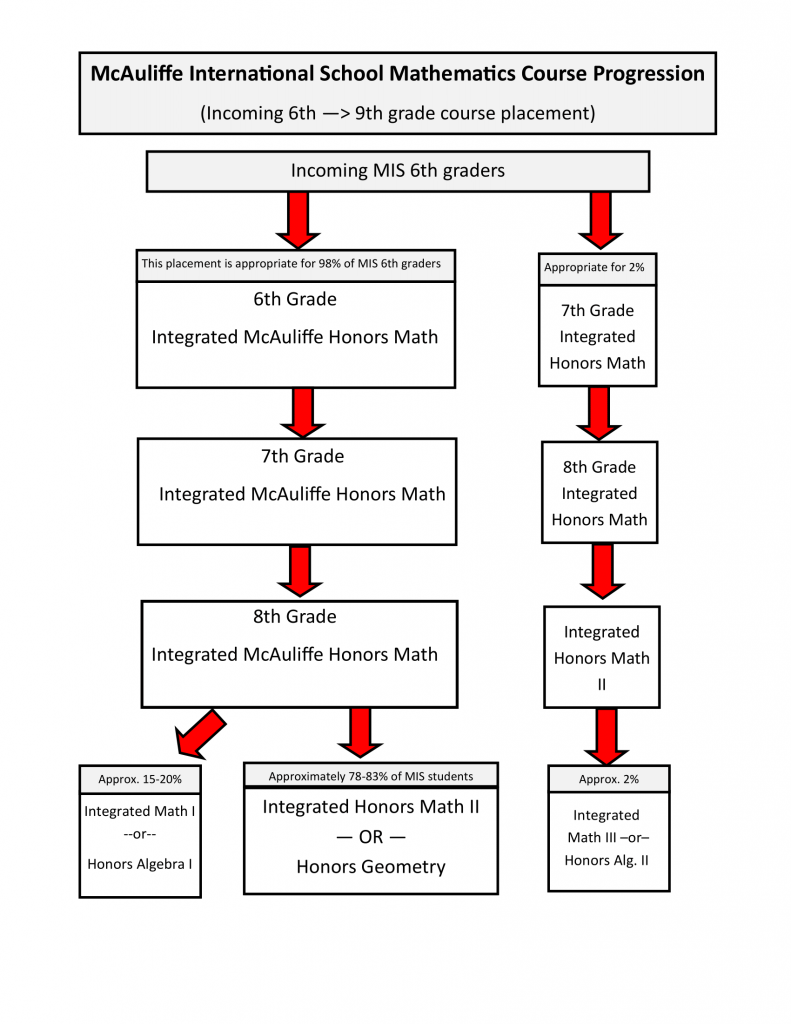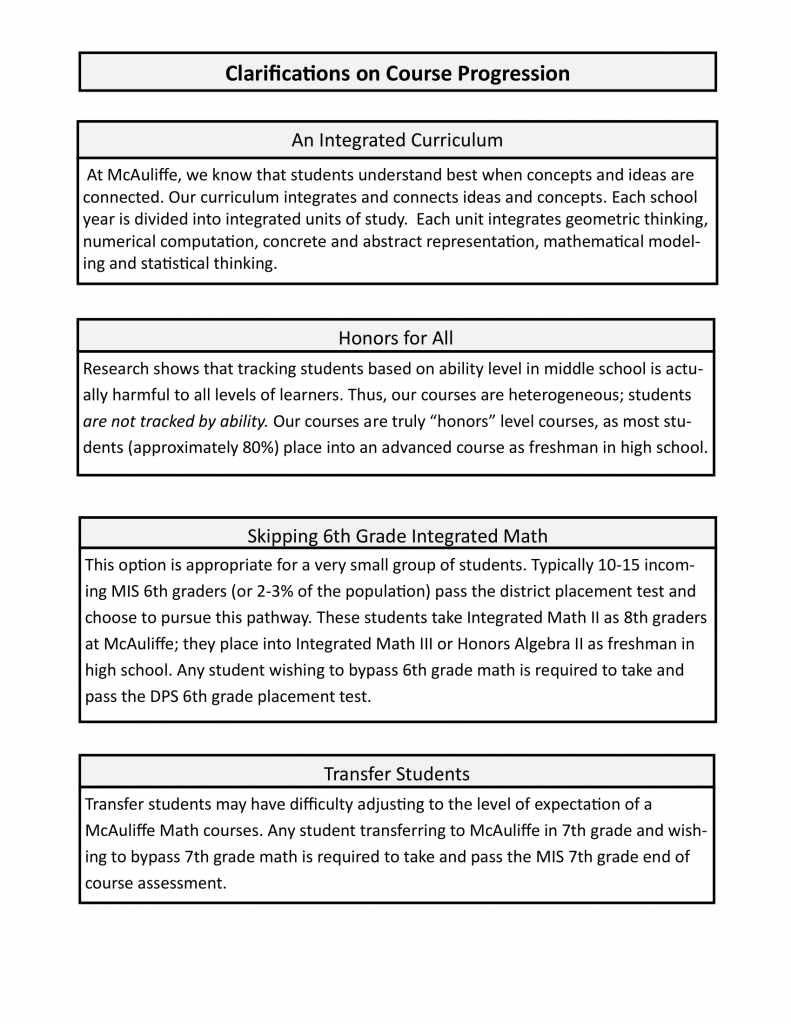The McAuliffe math department places a robust emphasis on building mathematical foundational skills as well as providing all students with diverse opportunities to excel.
All 6th grade students take an honors math class that focuses on endowing every student with the skills and concepts that they need to be successful in math for the rest of middle school and high school. Occasionally, a 6th grade student will be placed in a 7th grade math class if they meet the following criteria:
Please see below for the progressions for a student through middle school math at McAuliffe into their first year of high school.


Our efforts in the Language and Literature Department are guided by the Common Core State Standards.
Through literature, we hope to empower students with close reading skills that enable them to tackle any text in any subject with confidence. Our lessons require understanding of reading on the literal level, but also encourage deep thematic thinking about texts as well as careful analysis of any author’s craft. Our anchor texts include short fiction, poems, novels, narrative nonfiction, and argumentative texts from a range of historical periods and cultures.
Through writing, we develop skills in narrative, expository, and argumentative writing genres by facilitating a mastery of the writing process through a writers’ workshop approach. We study exemplar texts, looking closely at how skilled writers use language, and then practice those skills for mastery in order to produce our own texts.
As readers and writers ourselves, we seek to do all this while fostering a deep appreciation and love of reading and writing and an enduring understanding that language is an essential tool for communication. We know that with hard work and perseverance, our students will develop the literacy skills that will enable them to succeed in school and contribute to the world as a global citizen.
In science class at McAuliffe, we use inquiry-based instruction so that students are doing science and developing content knowledge alongside the experimental design, investigation, problem solving, and reasoning and reflection skills necessary to be strong scientists.
In 6th Grade Earth Science, students work as teams to conduct experiments, explore questions, solve problems, evaluate their progress, share solutions and debate scientific issues. Students start the year with an exploration of what it means to be a scientist and do science. Next, we delve into Earth’s geology, the rock cycle, and plate tectonics. Students study Earth’s closest celestial neighbors in our third unit on the sun, moon, and planets in our solar system. We return to Earth with a look at the features that make Earth distinct from its planetary compatriots, including the atmosphere and presence of water. Students then study how water and atmosphere combine to make weather and how long-term weather patterns form the climates of Earth.
In 7th grade Life Science, we begin the year by learning how scientists study people and how we can use knowledge of body systems to make healthy lifestyle choices. Then we zoom in to microbiology and study cells, viruses, and genetics before heading back out to larger scale ecosystems, evolution, and bioengineering. Throughout the year, students work in teams and independently to find their unique strengths and interests in science as we design our own projects and labs and work on challenges that appeal to multiple learning styles.
In 8th Grade Physical Science, we will continue to develop students’ scientific inquiry skills through creating and developing models, designing scientific investigations, and constructing explanations based on evidence. We will cover physics and chemistry standards with topics such as energy, force and motion, waves and technology, and matter and interactions. Long-term projects that embed engineering practices such as solar ovens, electric cars, water filters, and bottle rockets will be incorporated throughout the units. Students will engage in independent and group work activities and will finish the year with a student-designed capstone experiment. Students will be expected to participate in scientific argumentation verbally and in writing and be able to base their arguments off evidence collected in class or by other scientists. Eighth grade science students will also take the Science Colorado Measure of Academic Success in the spring, which covers science from all three disciplines (Earth, Life, and Physical).
Social Studies classes at McAuliffe International School challenge students to look beyond their understanding of their immediate time, place and culture. Our lens is the four key subjects within the social studies strand: geography, history, government, and economics, including personal financial literacy. Within this lens, our objectives are grouped into four primary categories: knowledge and understanding, investigation, thinking critically, and communicating.
In 6th grade, we explore the complex history, geography, economics, civics, and cultural interaction of the Western Hemisphere (except the United States). Students will gain an understanding of the importance of maps and other geographic tools and the connections that can be made by both physical and human geography. Students will also investigate the interaction of unique cultures like the Maya, Inca and Aztec and look at historic and modern conflicts over land, resources and governmental control. Students will become historians and critical thinkers, including the ability to utilize historical documents while writing argumentative historical essays.
In 7th grade, we build on students’ knowledge gained in 6th grade, continuing to focus on history, geography, civics and economics, and move into the Eastern Hemisphere. Topics covered range from the origins of civilization in Mesopotamia, China and India, to the great empires of Egypt, Greece, and Rome. We will investigate modern issues such as the Middle East Conflict, and continue to use historical documents to write argumentative essays. We also take part in the “History Day in Colorado” event, which invites students to research and present one of a wide-range of historical topics.
In 8th grade, we again focus on history, geography, civics and economics, this time through the lens of United States history from the Revolutionary time period through Reconstruction. Students will engage in debates and other real life learning experiences (mock congressional hearings, public policy portfolios, etc.) to show their mastery of the standards. Students will continually develop their own questions, research possible answers, and share their learning through both argumentative and informational/explanatory writing.
Students at McAuliffe explore different areas in the arts and enroll in their full-year arts elective at the time of course selections. In each course, students develop skills in order to create and present art while deepening their understanding of art in the world. Students must be proficient in literacy and math to participate.
Course options include:
McAuliffe International School offers Spanish and Mandarin in our World Languages program. Students choose their preferred language of study during our course selection process once they are enrolled and must be proficient in literacy and math to participate. In addition to gaining proficiency in another language, the courses aim to develop respect for other cultures and a lifelong interest in and enjoyment of language.
Levels of study are as follows:
Physical Education at McAuliffe International School guides students to find their own joy in movement. Students leave our program with the confidence and competence to participate in a variety of physical activities. In addition, students leave with a sense of integrity and compassion for others that enable them to be leaders in sport and in their community.
Dressing out for class: Students are not expected to dress out for class, instead, on days students have PE we ask them to come to school in clothes they are comfortable moving in.